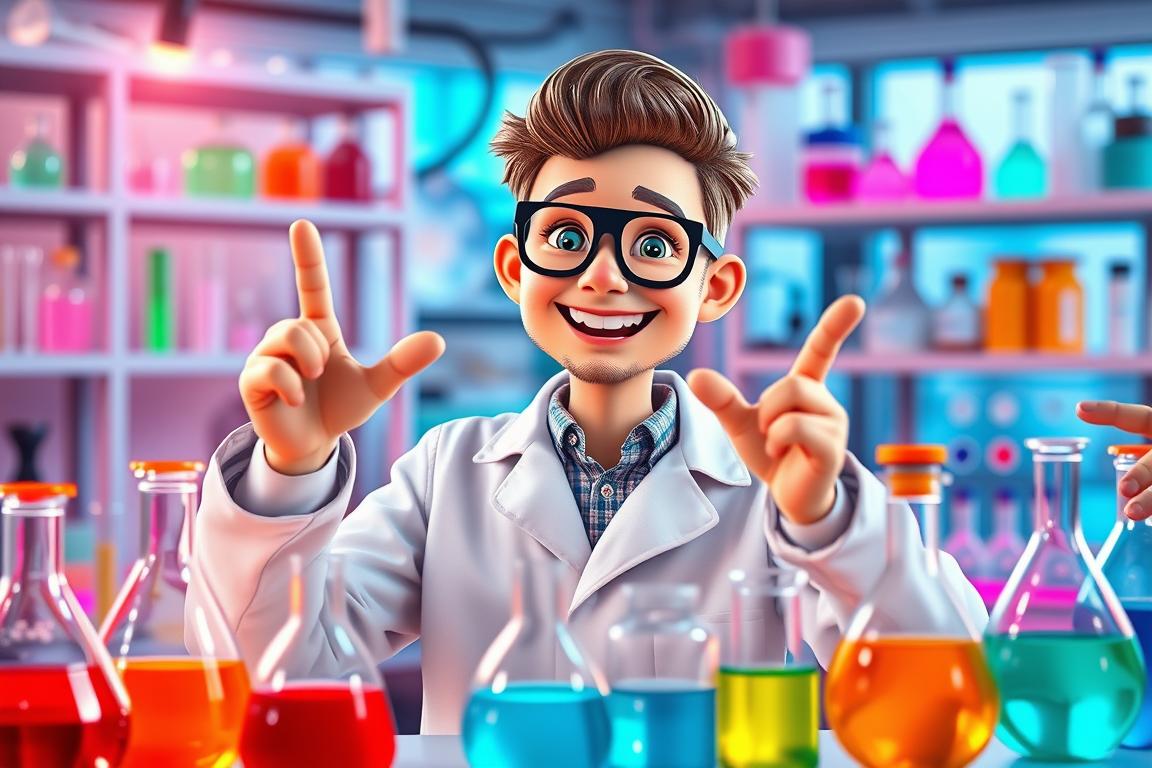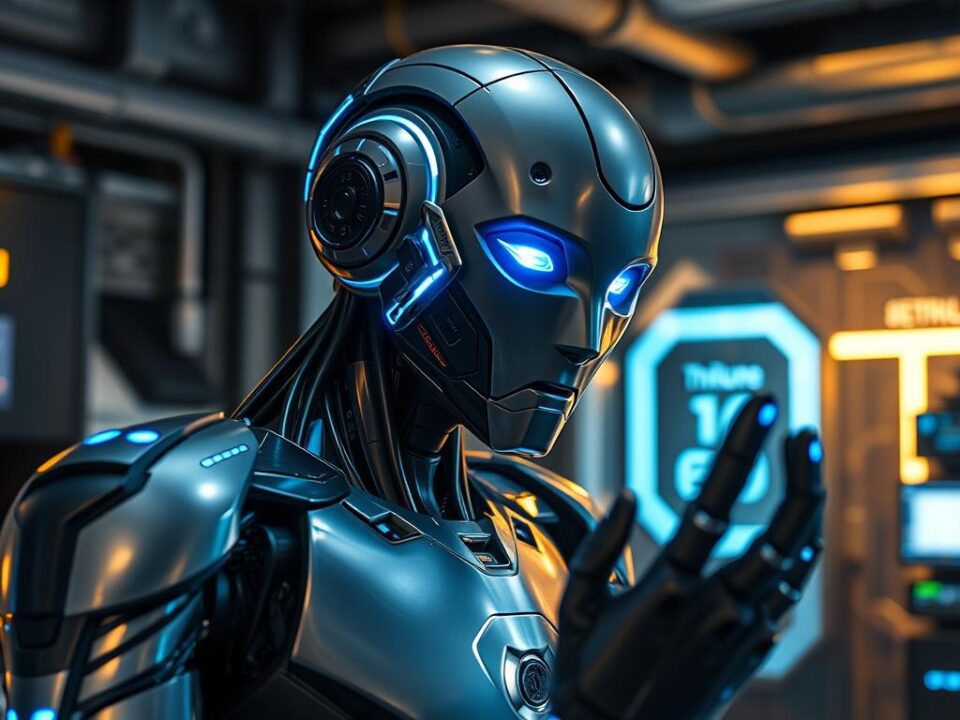Welcome to a world where learning meets technology in a fun way! Meet Astro, your AI scientist friend. Astro makes learning science fun and interactive. It uses artificial intelligence to make hard science ideas easy for everyone to understand.
Imagine doing 32 cool experiments, like controlling emotions or creating anything you dream of. All while having a blast! With Astro, science is just a click away. It sparks curiosity and helps people love STEM.
Get ready for a journey where tech and creativity come together. It’s going to be an exciting ride!
What Is an AI Scientist Friend?
An AI scientist friend is a new idea in science. It’s a smart helper for learning. It makes understanding science easier with its advanced tech.
Understanding the Concept
An AI scientist friend is always ready to help. It’s not like old school tools that only work when you’re awake. It’s always there, ready to assist, no matter the time.
This means you can learn science whenever you want. It helps you get better at understanding AI in science at your own speed.
Role in Modern Science
In today’s science, technology plays a big part. AI scientist friends help by sorting through lots of data. They make research better.
Tools like ChatGPT are changing how scientists work. They lead to new ways of working together and trying new things.
Studies show AIs can help solve tough problems and improve social skills. They give feedback too. AI scientist friends make learning science more fun and effective.
They learn and get better with each use. This makes AI a key player in the future of learning and discovery.
The Evolution of AI in Scientific Research
The history of AI in science is filled with innovation and change. It has deeply influenced how we do research today. Looking back at AI’s past helps us see how it has changed science.
Historical Context
In 1955, John McCarthy coined the term artificial intelligence. This started a new chapter in computer science. During World War II, math advancements helped AI grow.
At Bletchley Park, England, important computing breakthroughs happened. These were driven by military needs and teamwork between the government and private companies. This teamwork built strong systems for handling big data, making AI a key part of science.
Today, we face issues like data privacy and ethics. The power imbalance in data handling is a big concern. Data breaches also make us worry about keeping information safe. We need better ways to protect data and talk about AI’s ethics.
Recent Advancements
Recently, AI has made big strides in science. For example, Dr. Benji Maruyama’s ARES system is a big step forward. Launched in 2021, ARES is praised for its abilities and aims to make science more accessible.
ARES is designed to help the next generation of scientists. It offers tools for schools to teach science through robotics. The goal is to increase diversity in research and get more people involved in science.
How Astro Makes Science Accessible
Astro changes the game in making science easy to understand. This AI tool breaks down hard topics into simple parts. It makes sure users get the main ideas without feeling lost.
With Astro, learning becomes fun and interactive. It turns boring lessons into exciting adventures. This sparks curiosity and encourages people to explore more.
Simplifying Complex Concepts
Astro uses smart methods to make tough science easy. It breaks down big ideas into smaller, easier pieces. This way, learners can understand even the most complex topics.
The interface is easy to use, helping users move through different subjects smoothly. Interactive tutorials make learning fun for everyone. This shows Astro’s dedication to making science open to all.
Engaging Learning Experiences
Astro makes learning fun and engaging. It uses games and interactive tools to create a lively learning environment. Users get to do hands-on experiments that are both fun and educational.
With Astro, science is an exciting journey. It motivates users to keep exploring and trying new things.
Real-World Applications of Astro
Astro’s framework brings together many applications in different scientific fields. It uses AI to change how students and researchers work with big data and live monitoring. Astro leads in using these technologies to give important insights in fields like environmental science and health tech.
AI in Environmental Science
Astro lets students explore environmental science innovations. AI tools are key in analyzing data for better ecosystem management. They help monitor natural resources, predict climate changes, and check biodiversity impacts.
With Astro, students can see climate patterns and their effects through simulations. This helps them understand environmental challenges better.
AI in Health and Medicine
In health, Astro shows off advanced AI applications leading to big health tech breakthroughs. Students learn to improve diagnostic processes through predictive analytics. This improves patient care.
By using data-driven methods, students see how AI is used in health tech. They learn to tackle global health issues and gain the skills needed.
Interactive Features of Astro
Astro’s interactive features make learning science fun and hands-on. It turns science into an enjoyable activity. Users can explore science through engaging activities.
Virtual Experiments
Astro is great for virtual experiments. Users can try out real-world science processes safely. This helps them understand complex ideas better.
It makes learning science exciting and different from traditional methods.
Personalized Learning Paths
Astro offers personalized learning paths. It adjusts to each user’s knowledge and skills. This keeps learning interesting and ensures they learn important science concepts.
Users can learn at their own speed. This makes learning both effective and rewarding.
Building Your Own AI Scientist Friend
Creating your own AI scientist friend is exciting. It lets you learn and innovate. You need the right tools and programming skills to start this DIY AI scientist project.
Choosing the Right Tools
Choosing the right programming languages is key. Python is great because it’s easy to use and versatile. It’s perfect for beginners and experts alike.
Here are some libraries that will help your AI project:
- speech_recognition
- pyttsx3
- datetime
- webbrowser
These libraries help make voice assistants that can understand and talk back. As more people want voice assistants, learning these tools is important.
Programming Basics
Knowing the basics of programming is essential. Start with simple things like:
- Setting up the environment
- Writing algorithms to process data
- Integrating error handling and ensuring speech recognition accuracy
Try out different conversations to see what your AI can do. This lets you make your AI friend unique. You can add things like empathy and style to make it special.
This hands-on learning deepens your understanding of technology. It also boosts your creativity in programming for science.
The Benefits of Learning with Astro
Learning with Astro offers many benefits that make education more fun and effective. It uses interactive elements and engaging content to help users develop important skills. Two key advantages are improving critical thinking in science and sparking curiosity in learners.
Enhancing Critical Thinking
Astro’s method of scientific inquiry boosts critical thinking in science. It challenges users with tough experiments and problem-solving tasks. This helps students think analytically, evaluate information, and apply their knowledge in creative ways.
This approach helps learners critically analyze scientific concepts. It’s crucial for their scientific literacy.
Boosting Curiosity
Astro is great at enhancing curiosity in students. It offers a rich platform for exploration, encouraging learners to delve deeper into scientific phenomena. This curiosity not only makes learning fun but also prepares students for a lifelong journey of scientific discovery.
As users engage with Astro, their curiosity grows. This inspires them to seek knowledge beyond the screen.
Challenges in AI Science Communication
Understanding AI technology is hard in science communication. Many AI misconceptions make it hard to see how AI helps in research and learning. This misinformation can make people scared and skeptical, seeing AI as a threat to human roles in science.
It’s important to clear up these misconceptions for better communication.
Misconceptions About AI
Some think AI can do everything and replace human thinking and creativity. But AI can actually help in science by working together with humans. Teaching about AI’s uses can help overcome these AI communication challenges.
By sharing true info about AI, we can reduce fears and increase understanding.
Overcoming Barriers to Understanding
Science education barriers make it tough to understand AI. These come from hard-to-understand words and a lack of easy-to-use materials. Also, old media struggles in today’s social media world, making it hard to share true info.
Using simple language and examples that people can relate to helps. Hands-on activities and clear pictures can also make AI and its science role clearer.
The Future of AI in Education
Artificial intelligence is becoming more important in schools, offering new ways to learn. It’s making education better by creating new tools and partnerships. This is exciting for the future of AI in schools.
Innovations on the Horizon
New technologies will change how we learn. AI can make learning more personal, helping students do better in school. It lets teachers tailor lessons to each student’s needs.
Students can also try out skills in safe, virtual labs. This is great for science and engineering. AI helps teachers see how students are doing, so they can help where needed.
Potential Collaborations
Working together is key to using AI in schools. Schools and researchers are teaming up, thanks to the U.S. National Science Foundation. They’re finding new ways to teach AI to kids of all ages.
They’re also making AI a part of regular school lessons. This helps teachers learn how to use AI in the classroom. Such partnerships can lead to better teaching tools and more support for teachers.
Conclusion: Embracing the AI Scientist Friend
Embracing AI in education is a big step forward in learning and science. Tools like Astro help students and fans explore complex topics. They make science fun and interactive.
By using AI tools, learners get valuable knowledge. They also keep their curiosity alive. This curiosity can last a lifetime.
Why You Should Get Involved
Now is a great time to join in. AI in education offers many benefits. It makes learning more accessible and fun.
AI helps in areas like medical diagnostics and farming. It’s not just about new tech. It’s about making learning better for everyone, including those with disabilities.
Next Steps in Your Science Journey
Think about what’s next in your science journey. You can explore AI on your own or work with teachers and science projects. There are many ways to go.
Using AI in education is key for the future. It prepares students for a changing world. They’ll have the skills to adapt and succeed.







